Diabetes: Comparing Type 1 and Type 2, Treatments, and Studies
VerifiedAdded on 2023/04/21
|5
|989
|59
Homework Assignment
AI Summary
This assignment provides a comprehensive overview of diabetes, differentiating between Type 1 and Type 2 diabetes, detailing their distinct characteristics and symptoms as defined by the American Diabetes Association (ADA). It explores dietary recommendations for diabetics, emphasizing the importance of balanced meals, the avoidance of added sugars, and the role of sugar alcohols. The assignment also includes summaries of relevant research articles, such as a systematic review on plant-based diets and their impact on diabetes management, as well as a study investigating the correlation between long working hours and the incidence of diabetes. The student assignment is contributed to Desklib, a platform offering AI-based study tools and resources for students.
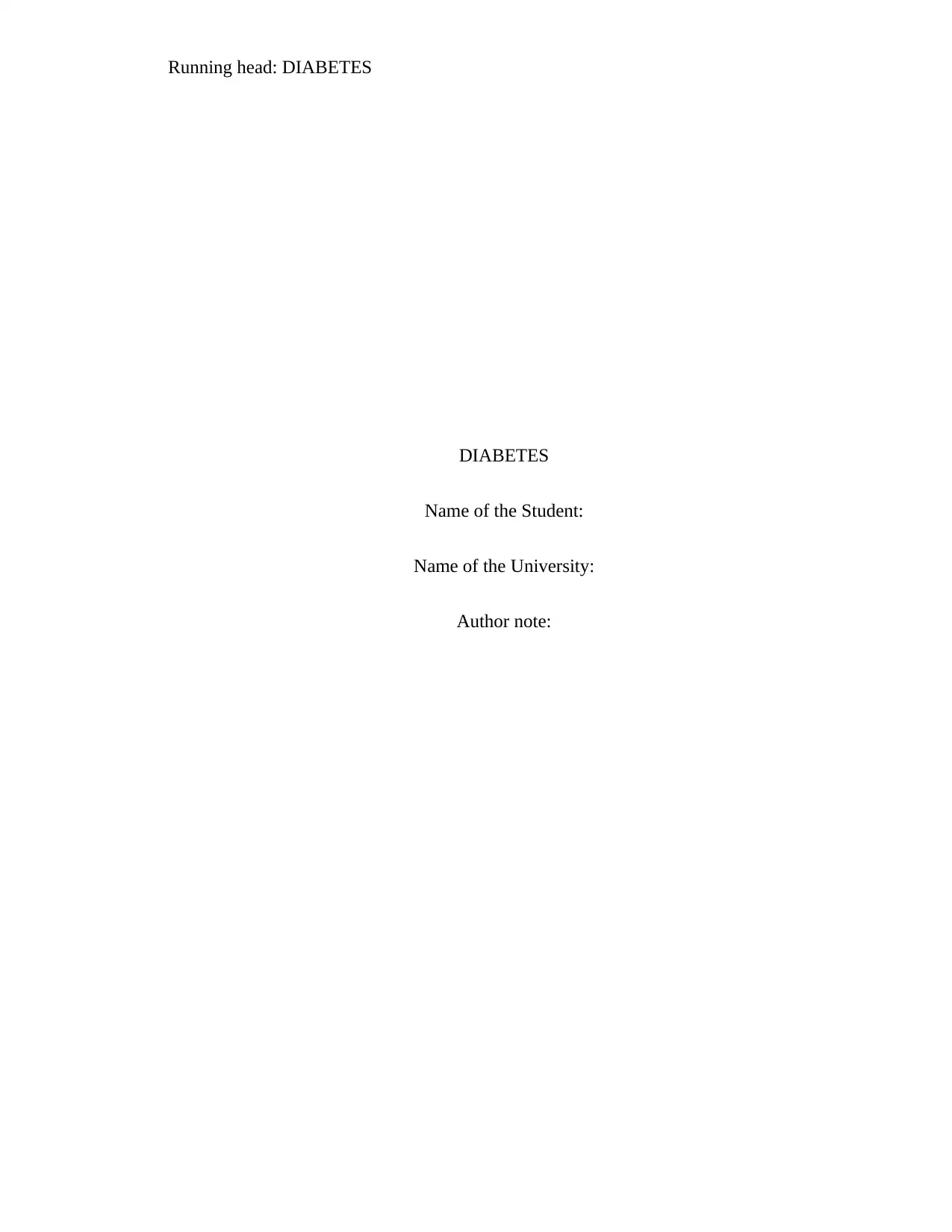
Running head: DIABETES
DIABETES
Name of the Student:
Name of the University:
Author note:
DIABETES
Name of the Student:
Name of the University:
Author note:
Paraphrase This Document
Need a fresh take? Get an instant paraphrase of this document with our AI Paraphraser
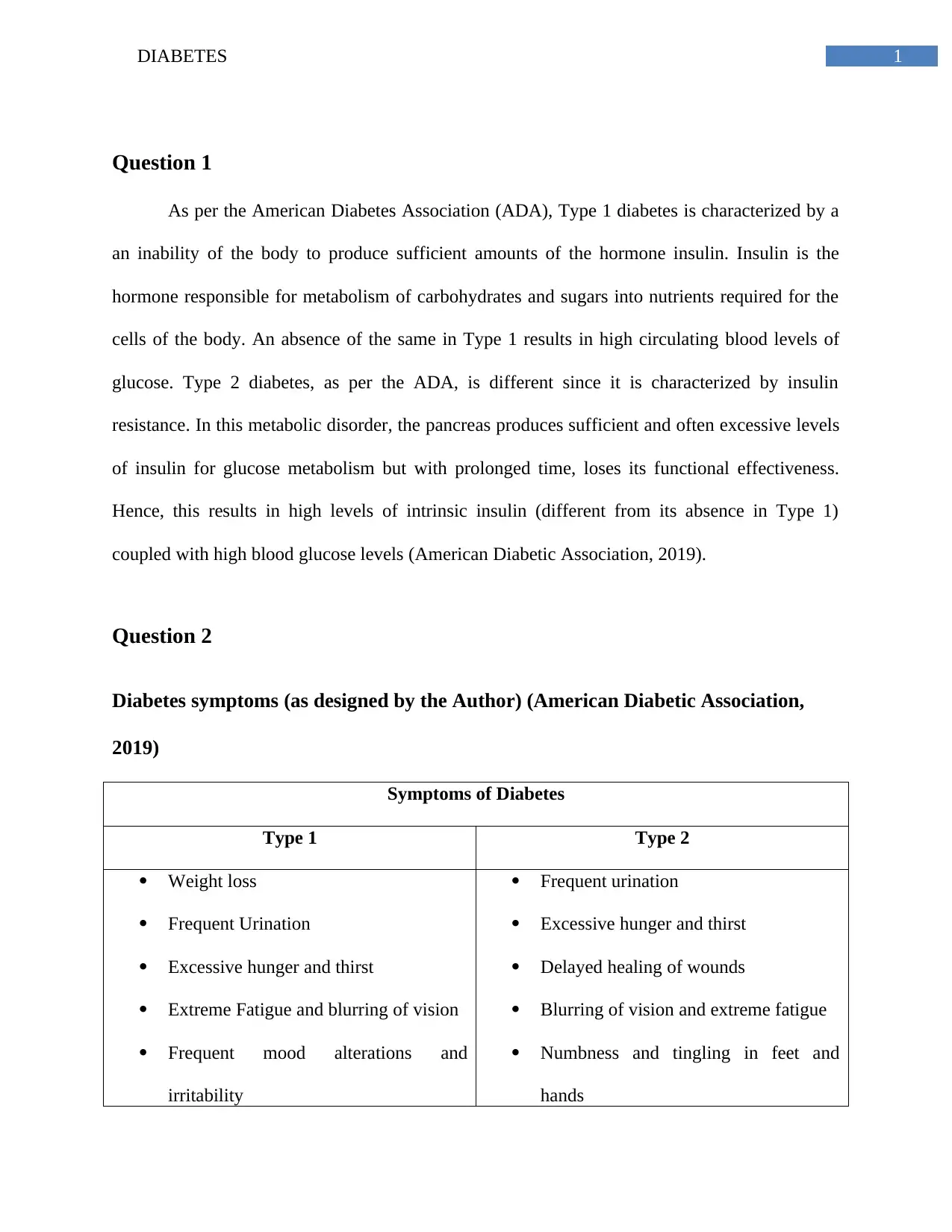
1DIABETES
Question 1
As per the American Diabetes Association (ADA), Type 1 diabetes is characterized by a
an inability of the body to produce sufficient amounts of the hormone insulin. Insulin is the
hormone responsible for metabolism of carbohydrates and sugars into nutrients required for the
cells of the body. An absence of the same in Type 1 results in high circulating blood levels of
glucose. Type 2 diabetes, as per the ADA, is different since it is characterized by insulin
resistance. In this metabolic disorder, the pancreas produces sufficient and often excessive levels
of insulin for glucose metabolism but with prolonged time, loses its functional effectiveness.
Hence, this results in high levels of intrinsic insulin (different from its absence in Type 1)
coupled with high blood glucose levels (American Diabetic Association, 2019).
Question 2
Diabetes symptoms (as designed by the Author) (American Diabetic Association,
2019)
Symptoms of Diabetes
Type 1 Type 2
Weight loss
Frequent Urination
Excessive hunger and thirst
Extreme Fatigue and blurring of vision
Frequent mood alterations and
irritability
Frequent urination
Excessive hunger and thirst
Delayed healing of wounds
Blurring of vision and extreme fatigue
Numbness and tingling in feet and
hands
Question 1
As per the American Diabetes Association (ADA), Type 1 diabetes is characterized by a
an inability of the body to produce sufficient amounts of the hormone insulin. Insulin is the
hormone responsible for metabolism of carbohydrates and sugars into nutrients required for the
cells of the body. An absence of the same in Type 1 results in high circulating blood levels of
glucose. Type 2 diabetes, as per the ADA, is different since it is characterized by insulin
resistance. In this metabolic disorder, the pancreas produces sufficient and often excessive levels
of insulin for glucose metabolism but with prolonged time, loses its functional effectiveness.
Hence, this results in high levels of intrinsic insulin (different from its absence in Type 1)
coupled with high blood glucose levels (American Diabetic Association, 2019).
Question 2
Diabetes symptoms (as designed by the Author) (American Diabetic Association,
2019)
Symptoms of Diabetes
Type 1 Type 2
Weight loss
Frequent Urination
Excessive hunger and thirst
Extreme Fatigue and blurring of vision
Frequent mood alterations and
irritability
Frequent urination
Excessive hunger and thirst
Delayed healing of wounds
Blurring of vision and extreme fatigue
Numbness and tingling in feet and
hands
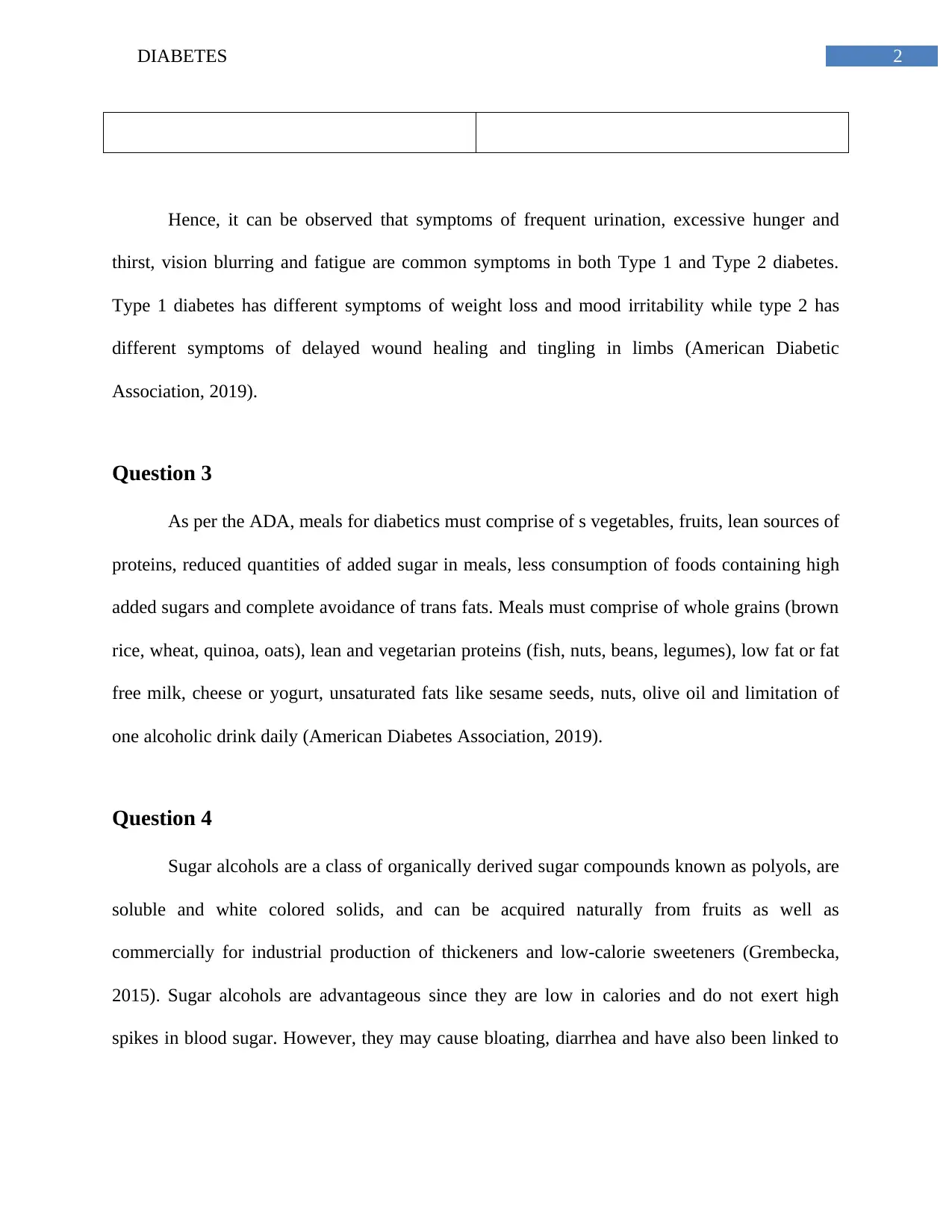
2DIABETES
Hence, it can be observed that symptoms of frequent urination, excessive hunger and
thirst, vision blurring and fatigue are common symptoms in both Type 1 and Type 2 diabetes.
Type 1 diabetes has different symptoms of weight loss and mood irritability while type 2 has
different symptoms of delayed wound healing and tingling in limbs (American Diabetic
Association, 2019).
Question 3
As per the ADA, meals for diabetics must comprise of s vegetables, fruits, lean sources of
proteins, reduced quantities of added sugar in meals, less consumption of foods containing high
added sugars and complete avoidance of trans fats. Meals must comprise of whole grains (brown
rice, wheat, quinoa, oats), lean and vegetarian proteins (fish, nuts, beans, legumes), low fat or fat
free milk, cheese or yogurt, unsaturated fats like sesame seeds, nuts, olive oil and limitation of
one alcoholic drink daily (American Diabetes Association, 2019).
Question 4
Sugar alcohols are a class of organically derived sugar compounds known as polyols, are
soluble and white colored solids, and can be acquired naturally from fruits as well as
commercially for industrial production of thickeners and low-calorie sweeteners (Grembecka,
2015). Sugar alcohols are advantageous since they are low in calories and do not exert high
spikes in blood sugar. However, they may cause bloating, diarrhea and have also been linked to
Hence, it can be observed that symptoms of frequent urination, excessive hunger and
thirst, vision blurring and fatigue are common symptoms in both Type 1 and Type 2 diabetes.
Type 1 diabetes has different symptoms of weight loss and mood irritability while type 2 has
different symptoms of delayed wound healing and tingling in limbs (American Diabetic
Association, 2019).
Question 3
As per the ADA, meals for diabetics must comprise of s vegetables, fruits, lean sources of
proteins, reduced quantities of added sugar in meals, less consumption of foods containing high
added sugars and complete avoidance of trans fats. Meals must comprise of whole grains (brown
rice, wheat, quinoa, oats), lean and vegetarian proteins (fish, nuts, beans, legumes), low fat or fat
free milk, cheese or yogurt, unsaturated fats like sesame seeds, nuts, olive oil and limitation of
one alcoholic drink daily (American Diabetes Association, 2019).
Question 4
Sugar alcohols are a class of organically derived sugar compounds known as polyols, are
soluble and white colored solids, and can be acquired naturally from fruits as well as
commercially for industrial production of thickeners and low-calorie sweeteners (Grembecka,
2015). Sugar alcohols are advantageous since they are low in calories and do not exert high
spikes in blood sugar. However, they may cause bloating, diarrhea and have also been linked to
⊘ This is a preview!⊘
Do you want full access?
Subscribe today to unlock all pages.

Trusted by 1+ million students worldwide
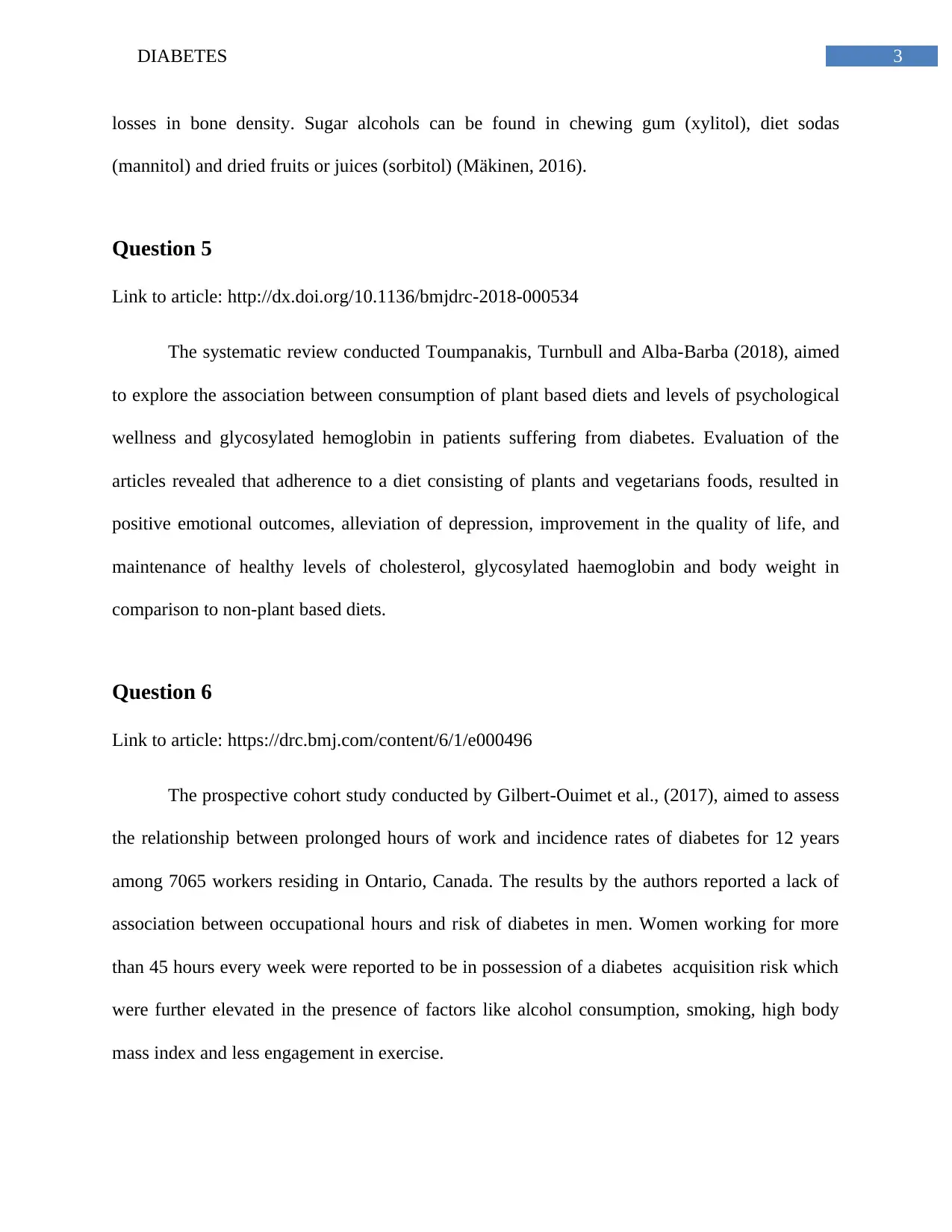
3DIABETES
losses in bone density. Sugar alcohols can be found in chewing gum (xylitol), diet sodas
(mannitol) and dried fruits or juices (sorbitol) (Mäkinen, 2016).
Question 5
Link to article: http://dx.doi.org/10.1136/bmjdrc-2018-000534
The systematic review conducted Toumpanakis, Turnbull and Alba-Barba (2018), aimed
to explore the association between consumption of plant based diets and levels of psychological
wellness and glycosylated hemoglobin in patients suffering from diabetes. Evaluation of the
articles revealed that adherence to a diet consisting of plants and vegetarians foods, resulted in
positive emotional outcomes, alleviation of depression, improvement in the quality of life, and
maintenance of healthy levels of cholesterol, glycosylated haemoglobin and body weight in
comparison to non-plant based diets.
Question 6
Link to article: https://drc.bmj.com/content/6/1/e000496
The prospective cohort study conducted by Gilbert-Ouimet et al., (2017), aimed to assess
the relationship between prolonged hours of work and incidence rates of diabetes for 12 years
among 7065 workers residing in Ontario, Canada. The results by the authors reported a lack of
association between occupational hours and risk of diabetes in men. Women working for more
than 45 hours every week were reported to be in possession of a diabetes acquisition risk which
were further elevated in the presence of factors like alcohol consumption, smoking, high body
mass index and less engagement in exercise.
losses in bone density. Sugar alcohols can be found in chewing gum (xylitol), diet sodas
(mannitol) and dried fruits or juices (sorbitol) (Mäkinen, 2016).
Question 5
Link to article: http://dx.doi.org/10.1136/bmjdrc-2018-000534
The systematic review conducted Toumpanakis, Turnbull and Alba-Barba (2018), aimed
to explore the association between consumption of plant based diets and levels of psychological
wellness and glycosylated hemoglobin in patients suffering from diabetes. Evaluation of the
articles revealed that adherence to a diet consisting of plants and vegetarians foods, resulted in
positive emotional outcomes, alleviation of depression, improvement in the quality of life, and
maintenance of healthy levels of cholesterol, glycosylated haemoglobin and body weight in
comparison to non-plant based diets.
Question 6
Link to article: https://drc.bmj.com/content/6/1/e000496
The prospective cohort study conducted by Gilbert-Ouimet et al., (2017), aimed to assess
the relationship between prolonged hours of work and incidence rates of diabetes for 12 years
among 7065 workers residing in Ontario, Canada. The results by the authors reported a lack of
association between occupational hours and risk of diabetes in men. Women working for more
than 45 hours every week were reported to be in possession of a diabetes acquisition risk which
were further elevated in the presence of factors like alcohol consumption, smoking, high body
mass index and less engagement in exercise.
Paraphrase This Document
Need a fresh take? Get an instant paraphrase of this document with our AI Paraphraser
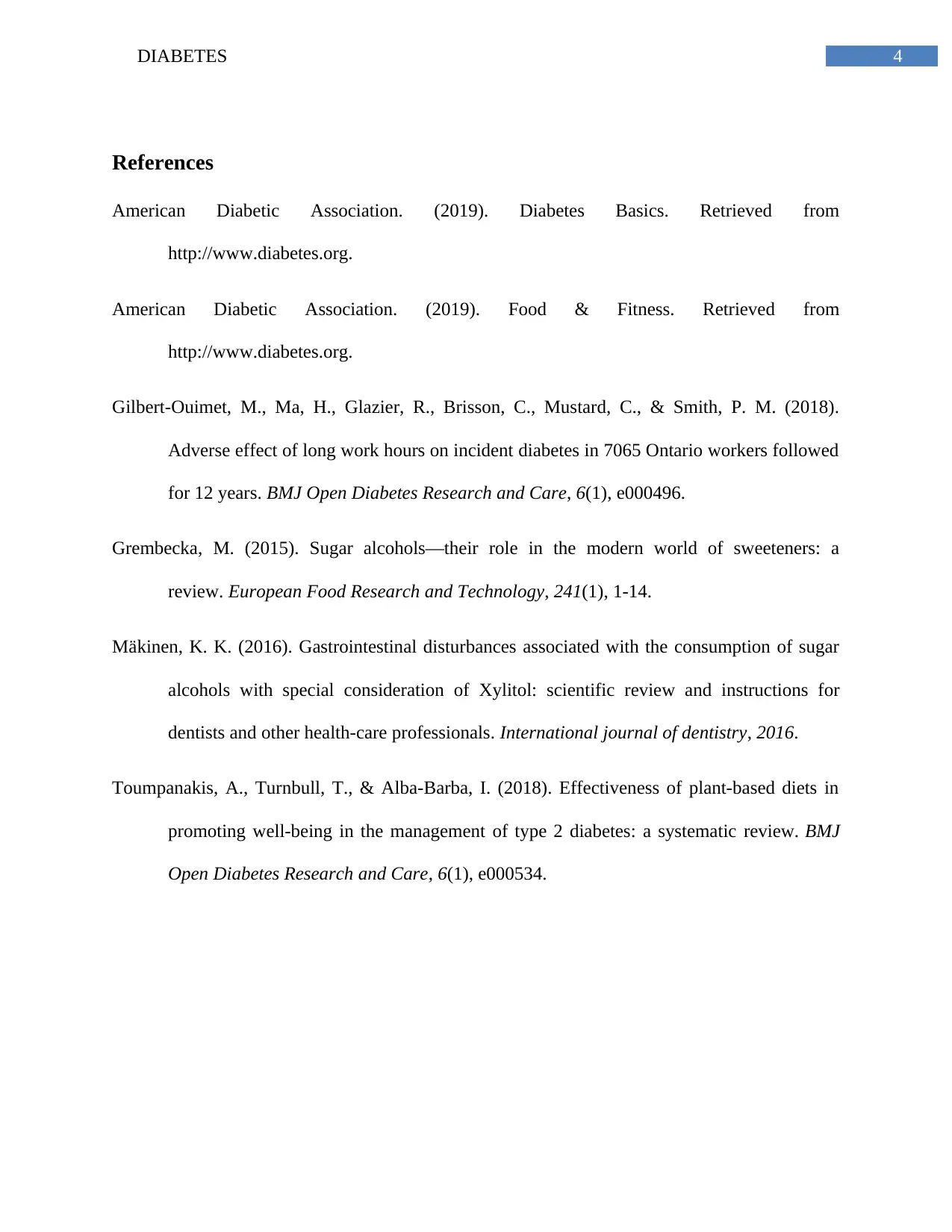
4DIABETES
References
American Diabetic Association. (2019). Diabetes Basics. Retrieved from
http://www.diabetes.org.
American Diabetic Association. (2019). Food & Fitness. Retrieved from
http://www.diabetes.org.
Gilbert-Ouimet, M., Ma, H., Glazier, R., Brisson, C., Mustard, C., & Smith, P. M. (2018).
Adverse effect of long work hours on incident diabetes in 7065 Ontario workers followed
for 12 years. BMJ Open Diabetes Research and Care, 6(1), e000496.
Grembecka, M. (2015). Sugar alcohols—their role in the modern world of sweeteners: a
review. European Food Research and Technology, 241(1), 1-14.
Mäkinen, K. K. (2016). Gastrointestinal disturbances associated with the consumption of sugar
alcohols with special consideration of Xylitol: scientific review and instructions for
dentists and other health-care professionals. International journal of dentistry, 2016.
Toumpanakis, A., Turnbull, T., & Alba-Barba, I. (2018). Effectiveness of plant-based diets in
promoting well-being in the management of type 2 diabetes: a systematic review. BMJ
Open Diabetes Research and Care, 6(1), e000534.
References
American Diabetic Association. (2019). Diabetes Basics. Retrieved from
http://www.diabetes.org.
American Diabetic Association. (2019). Food & Fitness. Retrieved from
http://www.diabetes.org.
Gilbert-Ouimet, M., Ma, H., Glazier, R., Brisson, C., Mustard, C., & Smith, P. M. (2018).
Adverse effect of long work hours on incident diabetes in 7065 Ontario workers followed
for 12 years. BMJ Open Diabetes Research and Care, 6(1), e000496.
Grembecka, M. (2015). Sugar alcohols—their role in the modern world of sweeteners: a
review. European Food Research and Technology, 241(1), 1-14.
Mäkinen, K. K. (2016). Gastrointestinal disturbances associated with the consumption of sugar
alcohols with special consideration of Xylitol: scientific review and instructions for
dentists and other health-care professionals. International journal of dentistry, 2016.
Toumpanakis, A., Turnbull, T., & Alba-Barba, I. (2018). Effectiveness of plant-based diets in
promoting well-being in the management of type 2 diabetes: a systematic review. BMJ
Open Diabetes Research and Care, 6(1), e000534.
1 out of 5
Related Documents
Your All-in-One AI-Powered Toolkit for Academic Success.
+13062052269
info@desklib.com
Available 24*7 on WhatsApp / Email
![[object Object]](/_next/static/media/star-bottom.7253800d.svg)
Unlock your academic potential
Copyright © 2020–2026 A2Z Services. All Rights Reserved. Developed and managed by ZUCOL.





